Newborn babies are more vulnerable to viral infections like cold. The symptoms of cold may make your newborn uncomfortable and offer severe nose congestion. It is necessary to make yourself well equipped with the remedies to treat cold in your baby.
Research shows that babies are more likely to get 8 to 10 colds a year as they have no immunity to cold viruses. With certain tips and precautions, you can improve the immunity of your baby against viral infections.
This article discusses the causes of cold in babies. It discusses the precautions to take when babies have cold.
Symptoms of Cold in Newborn Baby:
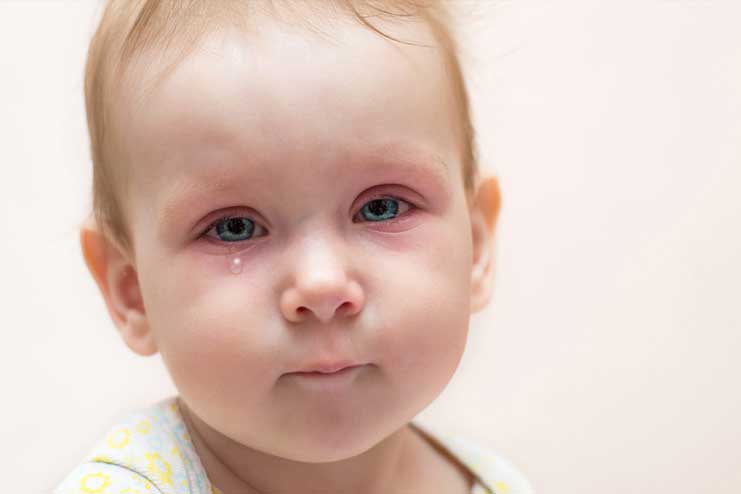
Usually the symptoms of cold will appear 1-3 days after getting infected. Blocked, stuffed or runny nose may be the first sign to recognize that your baby has cold. This is the very common and normal signs of cold in babies. The other symptoms may include:
- Fussiness
- Runny nose, the mucus may appear yellow or green
- Fever
- Cough which may get worse at the night
- Reluctant to eat or drink
- Nasal congestion and difficulty in breathing
- Trouble falling asleep
- Discharge from the eyes
- Vomiting, diarrhea
- Cold can also cause illness such as sore throat, pneumonia, and ear infections.
Causes of Cold in Babies:
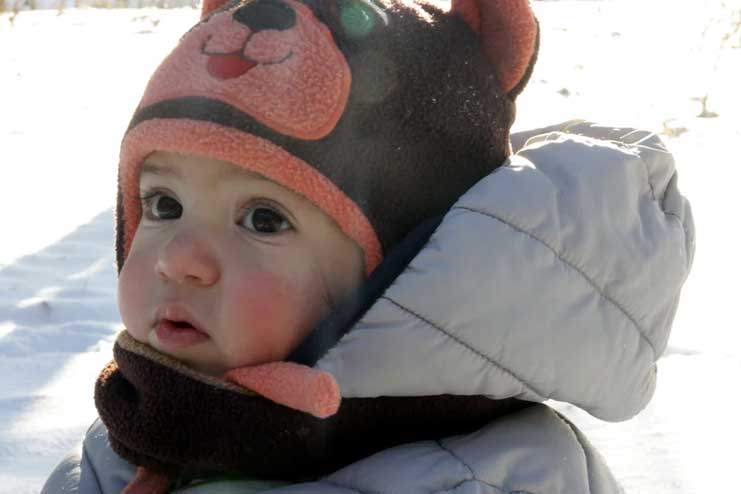
Another commonly used name for cold is upper respiratory infection. Severe cold may cause nasal congestion and your baby may find difficulty in breathing.
Here are a few reasons for viral cold in babies:
1. Dust Mite Allergy: Research by Mayo Clinic stated that it is an allergic reaction that occurs in response to the tiny bugs present the dust. Dust mites live on the bedding, soft furniture, and carpeting.
The common symptoms of dust mite allergy include hay fever, sneezing, and runny nose.
2. Direct Contact: Your baby may get cold when someone with cold touches or come in contact with your baby.
3. Contaminated Surfaces: Some virus may stay on the surfaces for more than 2 hours. Your baby catches the virus when they come in contact with the contaminated surfaces.
4. Immature immune system: Studies show that preterm babies smaller range of monocytes and neutrophils. These call may fail to kill the pathogens and reduce the production of cytokines which in turn reduces the ability to fight against bacteria and viruses.
5. Weather conditions: Cold weather conditions may cause cold in both adults and children. Colds during cold weather is due to the fact that upper respiratory tract may get narrow when it is cold. This may make difficult for the white blood cells to reach the mucus membrane that making it harder for the body top fight against germs.
What To Do When Babies Have Cold?
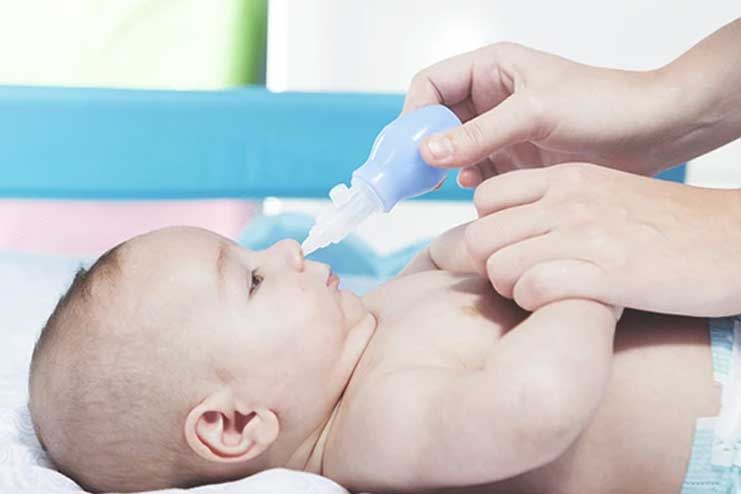
Follow the few precautions and make your baby feel better and comfortable. Here are a few natural remedies to get your baby into the recovery path.
1. Clear the mucus:
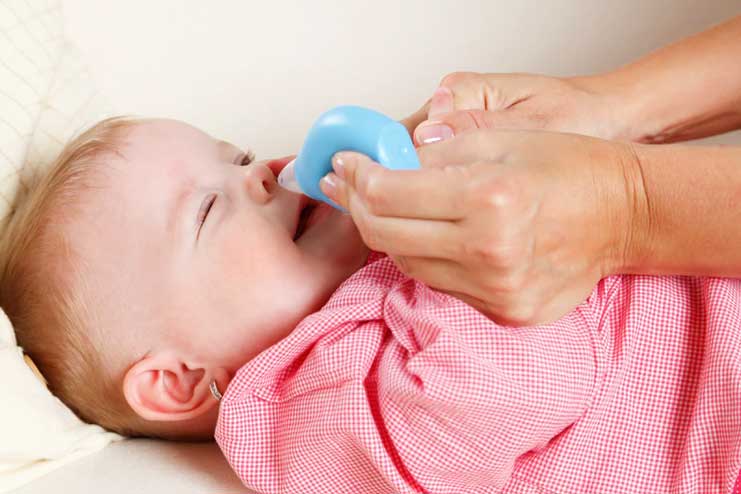
Make sure to keep your baby’s nasal passages clear. Babies can not blow out the mucus on their own. You can make use of rubber bulb syringe to expel the mucus out from the nose. Squeeze the mucus from each of the nostril more often. Make sure to clean the bulb syringe properly with water and soap after use.
Suctioning is necessary when your baby’s cough reflexes are not enough to flush out the mucus, saliva or vomit. It is preferred to suction before feeding so that they can eat better.
2. Keep your baby hydrated:
Just like the adults, Babies may not want to eat or drink when they are sick. Studies show that breastfeeding babies are less likely to be affected by respiratory infections. Try to feed your baby more frequently in small amounts. Offer unsweetened juices and offer for the babies above 8 months. Make sure that your baby should not get dehydrated.
Research shows that hot water and hot soups increase the nasal mucus velocity and help in maintaining the nasal passages clear.
3. Humidifier:
A humidifier creates the optimal breathing conditions by adding enough amounts of moisture to the air. Harsh and dry air may lead to sore throat, sinusitis, stuffy nose and nasal congestion. Humidifier relieves your baby from irritated and dry skin.
You will two types in humidifiers warm mist and cool mist. Warm mist humidifiers are preferred when your baby has the symptoms of the cold.
4. Keep your baby away from the sick people:
As long as your baby turns three months old avoid taking them to the public places and avoid the contact with the people having cold.
5. Help your baby to get relief from the sore throat:
Sore throat is one of the more common experiences that the child encounter during cold.
The following tips will give some relief to your baby:
• Allow your child to sip warm liquids
• Help them to eat cold or frozen liquids
• Gargle with salt water
6. Help your baby to cough out:
Babies have the poor muscle strength to clear out the phlegm. One way to help your baby clear out the phlegm is to take your baby into the bathroom and turn the shower on to make the room steamy and hot. It will help baby to loosen the mucus in the throat and make the cough more productive.
Try this technique before bedtime as the mucus tend to block the throat and the chest while lying down.
7. Record the temperature regularly:
It is more common for both the adults and children to get fever during the episodes of cold. You can record the temperature by using oral, forehead or ear thermometer. Any temperature below 102 degrees Fahrenheit is common and can be treated at home.
Studies show that Acetaminophen (paracetamol) and ibuprofen are the effective medicines for the treatment of fever in babies.
8. Help your baby to ease the congestion:
Nose blockage becomes more during the night time. Keep a few things ready to help your baby get relief. Keep humidifier ON, keep vicks vapor rub, warm coconut oil with some camphor pieces also works well to get rid of congestion.
Apply the vicks vapor rub over the nose, throat, chest and back of your baby. Do this before your baby sleeps. So that you can prevent them from the effects of nose blockage.
9. Avoid over the counter medication:
It is not recommended to use over the counter medicines for cough and cold in babies below 6 months except paracetamol and ibuprofen. Doctors suggest that usually antibiotics are not required for the common cold unless it develops any kind of other infections like ear or throat infections.
Studies suggest that it is not recommended for the babies below 1 year to use honey as it may cause botulism.
10. Encourage your baby to take more rest:
Babies need more rest especially when they are sick. Offer a comforting bedtime routine to your baby for the proper sleep. Take your baby for short walk before nap time. Make some lullabies to comfort your baby.
11. Wash your hands:
A research by centers for disease control and prevention (CDC) stated that about 30% of diarrhea related infections and 20% of respiratory infections can be prevented by hand washing.
Germs get onto your hand when you use the toilet or change the diaper. A single gram of human feces contain about one trillion of germs.
12. Keep your baby hydrated:
Just like the adults, babies don’t like to eat when they are sick. Encourage your little one to take enough amounts of feeding more regularly. If your baby regrets to drink milk consult the pediatrician to ensure that they are not dehydrated.
You can also offer small quantities of electrolytes for the babies above 6 months to prevent the risk of dehydration.
13. Consult your pediatrician at the right time:
Look for the warning signs and check with your pediatrician at the right time. Fever over 100 degrees Fahrenheit is severe for the babies of 3 months. For the older babies, it is recommended to consult the doctor for the fever more than 2-3 days.
Other signs that you should look in your baby are rapid wheezing, and strained breathing which may indicate virus or pneumonia.
When To Call a Doctor For Cold In Baby?
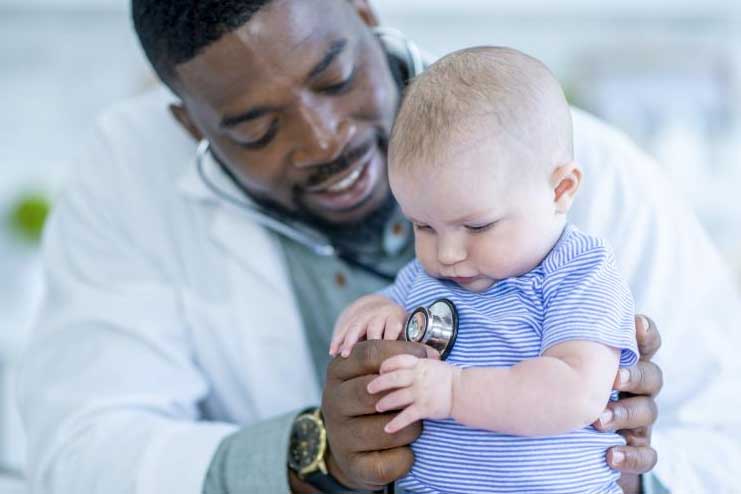
Doctors advise that it is better to take your baby below 3 months to the hospital at the first signs of illness. Because, babies are more likely to develop severe ill conditions like bronchiolitis, croup or pneumonia at this age.
For the babies above three months, look for the following symptoms to take them to the hospital:
- If your baby has difficulty in the breathing and you notice that skin around the ribs get sucked in for the each breathe.
- The lips or nails turn blue
- Your baby may have the ear pain and they often rub the ears while crying.
They look ill - They do not wet their diapers as usual.
- Runny nose and cough that last more than 10 days.
- Sometimes cold may develop ear infections and you can notice swelling around the ear or pus coming out of the ear.
Precautions To Take When Babies Have Cold:
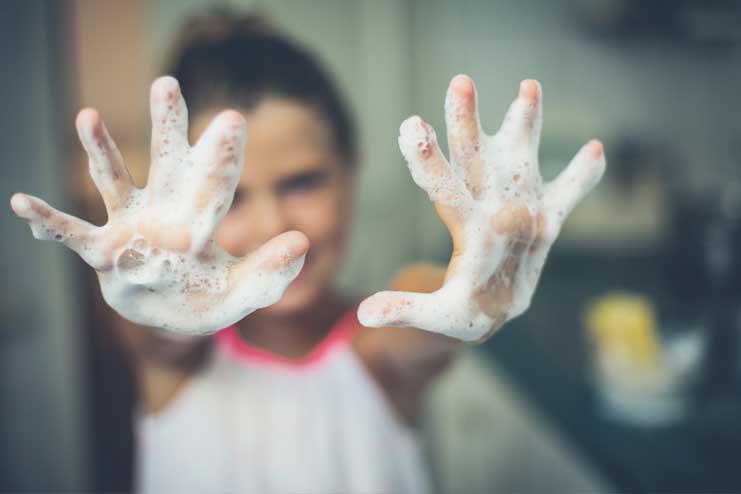
Follow the below thumb rules to make your baby get faster relief from the cold:
- Encourage visitors to wash their hands before they come in contact with your baby so that you may minimize the number of germs that affect your baby.
- Always keep a alcohol based hand sanitizer when you are going out. Allow others to use the sanitizer before touching your baby.
- Ensure that your baby is vaccinated properly as per the schedule
- Make sure that any sick people in your home should not make contact with your baby.
- Breastfeed your baby as the breastmilk contains the antibodies that will help to strengthen your child’s immune system.
In conclusion, Coughs and colds are more common for all the age groups. Cold may sustain in babies for two to three weeks. Be patient while treating the baby with cold and offer the techniques that comfort them.







































